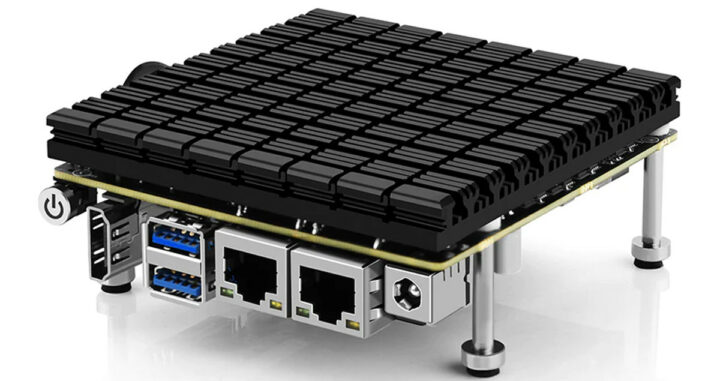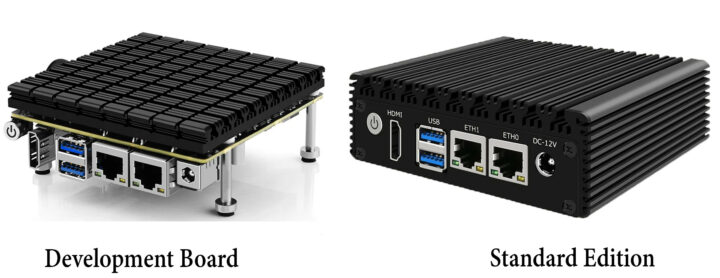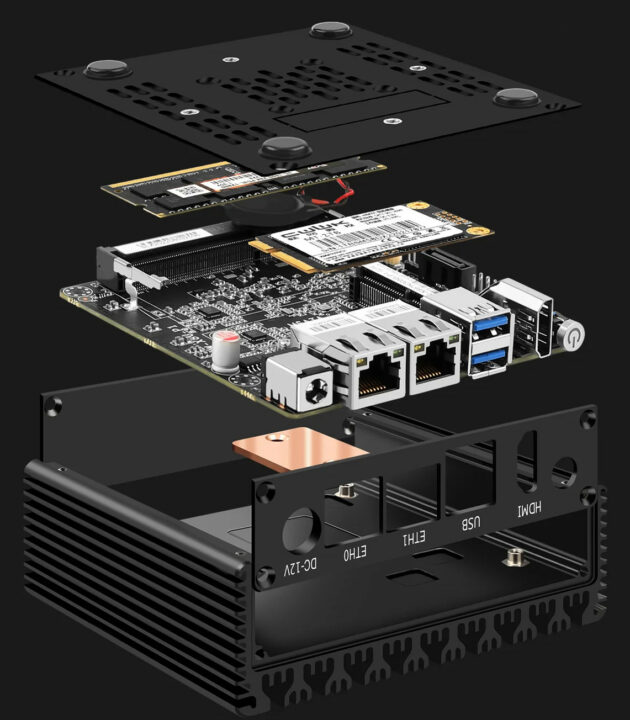In a previous post, we wrote about the CWWK X86-P5, a $219 fanless mini PC powered by the Alder Lake N-series N100 SoC. However, during a recent search on AliExpress, I stumbled upon the CWWK X86-P1 fanless mini PC and SBC. This compact device offers three variants (N3050, N3160, and N3700) with a TDP of only 6W.
It features dual GbE Ethernet, dual USB 3.0, HDMI, and a GPIO header. Additionally, it includes a built-in fan header for improved cooling. It supports Windows 11, Ubuntu 22.04, and networking OS options like pfSense or OpenWrt along with all major x86-based operating systems.
CWWK X86-P1 Fanless Mini PC Specification
- SoC options
- Intel Celeron N3050 – Dual core Braswell processor @ up to 2.16 GHz with Intel HD Graphics Gen8 – 6W TDP
- Intel Celeron N3160 – Quad-core Braswell processor @ up to 2.24 GHz with 12EU Intel HD graphics 400 – 4W SDP / 6W TDP)
- Intel Pentium N3700 – Quad-core Braswell processor @ up to 2.4 GHz with Intel HD Graphics – 6W TDP
- Memory – 1x DDR3L SODIMM 1.35V, 1333/1600 MHz up to 8GB maximum
- Storage – mSATA SATA3.0 interface (additional power supply required for SATA3.0 hard disk)
- Networking – 2x RJ45 ports with Realtek RTL8111H Gigabit Ethernet network controllers
- Display – HDMI 1.4 interface with audio output support for HD display
- USB – Dual USB 3.0 ports
- Misc
- Power Button
- 10-pin GPIO (4 in/4 out)
- CPU FAN (4pin 12V with temperature control)
- AMI BIOS with support for PXE, WOL, auto-start, and GPIO
- Power Supply – DC jack
- Dimensions – 90 x 90mm (board)
- Chassis – Aluminum alloy material for passive heat dissipation, dust prevention, and zero noise
- Operating Conditions
- Working temperature range: -10°C to 70°C
- Relative humidity- 5% to 90%, non-condensing
- Color Options – Black, Dark Green, Iron Gray
There are two variants of this board – a Standard Edition and a Development Board Edition. The Standard Edition comes in a metal case, while the Development Board comes with the heatsink mounted on the top.
The company does not mention any pre-installed operating system coming with this board, but they do state that the board supports FreeNAS, Home Assistant, Debian, CentOS, Ubuntu, Red Hat, Android, Windows, pfSense, OpenWRT, Node-RED, Proxmox, and more. Some of these are not operating systems per se but can be installed through an OS. For example, LibreELEC is a minimal OS based on Kodi.
Although the company provides a fan header for the board, I didn’t find any specific fan for this module. However, in our CWWK X86-P5 post, we saw the company showcasing the fan with that module. Nevertheless, the company provides a complete structural diagram to give you a better idea about the PC.
The CWWK X86-P1 Fanless Mini PC is available for purchase on AliExpress or through the company’s official store. The barebone X86-P1 model with the N3050 processor, without SSD or RAM, is priced at $101.44. The price increases to $181.55 for the N3700 variant equipped with 8GB RAM and a 128GB SSD.
Debashis Das is a technical content writer and embedded engineer with over five years of experience in the industry. With expertise in Embedded C, PCB Design, and SEO optimization, he effectively blends difficult technical topics with clear communication
Support CNX Software! Donate via cryptocurrencies, become a Patron on Patreon, or purchase goods on Amazon or Aliexpress








The problem with Intel SoCs is that we can’t know, from the TDP, even a ballpark figure for total power consumption. I know TDP is just for the SoC and the rest of the board needs power too, but we regularly see N100 machines (specced at 6W) using 10-12W at idle, and Ryzen U machines (specced at 35W) using 4-6W in the same conditions.
This is kinda ridiculous and it’s the main reason I’ve been avoiding Intel SoCs for my use case, which needs the lowest possible idle power usage.
Very old chips.
N3700 has 16 EUs, the other two have 12 EUs, all Intel (Gen8) HD Graphics (Braswell) according to Notebookcheck.
Old Intel processors made with the 14nm fab released in 2015 are still used in products.
Even though it is a type of Atom from almost 10 years ago, I think the current products are too expensive.
There are things Intel could do to improve on Alder Lake-N, like refresh the lineup with a 6-core, or bring back dual-channel in the next die. But N100 products aren’t very expensive compared to a $181 product with a 2015 N3700 Braswell chip. And the N100 is around 3-5 times as fast as that N3700, which is a huge difference to say the least.
Not to mention the N100 is capable of Win11, this one most likely isn’t. So next year it will be a Linux only machine. Some may even welcome this, but I guess many won’t.